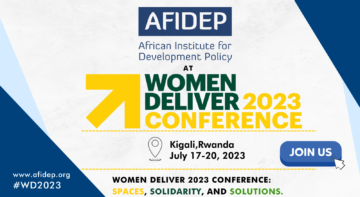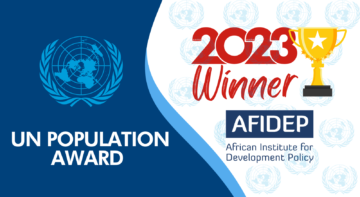Blogs

In 2017, the African Union adopted the theme, Harnessing the Demographic Dividend (DD) through investments in youth, a development focus that was extended to be the theme of the decade. Consequently, many Africa governments embraced the DD into their national development plans. With the COVID-19 pandemic outbreak, the continent’s ambition to reap a demographic dividend from its greatest resource -the youth, remains under threat.
Population dynamics, which refer to how and why populations change in size and structure over time are intricately tied to sustainable development strategies. As a result, countries monitor population change and trends in order to inform holistic and multi-sectoral approaches to sustainable development.
Compared to the rest of the world, Africa is youthful. The United Nations (UN) estimates that 60% of Africa’s population is under 25 years of age compared to a global average of 41%. The region can capitalise on this youthful population to benefit from the Demographic Dividend (DD), which is the economic benefit arising from a significant increase in the ratio of working-age adults relative to young dependents.
« The Demographic Dividend is not guaranteed by the shift in age structure alone but must be accompanied by investments in human capital development (health; education and skills) and promoting an enabling environment that provides opportunities for decent jobs. »
Bernard Onyango – Senior Research and Policy Analyst
The emergence of COVID-19 as a global pandemic in 2020, has implications for population dynamics. COVID-19 has caused major health, social and economic upheavals that present an indispensable need for demographers and policy makers to consider how the pandemic interacts with population dynamics and its implications for socio- economic well-being.
High-level webinar series
Between November and December 2020, South Africa’s Department of Social Development and Statistics South Africa collaborated with various partners to host a five-part webinar series themed, ‘Demography and COVID-19 in Africa – Evidence and Policy Responses to Safeguard the Demographic Dividend’. The other key partners of the initiative included: the United Nations Population Fund (UNFPA); the British High Commission to South Africa and the Foreign, Commonwealth and Development Office (FCDO); the African Union (AU) and Africa CDC; the African Institute for Development Policy (AFIDEP); the Union of African Population Studies (UAPS); and Population Association of Southern Africa (PASA).
The main objective of the webinar series was to provide a platform for stakeholders and partners to share demographic perspectives on the impact of COVID-19, considering its implications for Africa to achieve the demographic dividend, and realize the Sustainable Development Goals (SDGs).
“Safeguarding the Demographic Dividend is of utmost core to South Africa as we understand the pivotal role population dynamics play in helping countries to prosper if accompanied by investments to improve human capital including access to sexual and reproductive health services.”
H.E. Ms Lindiwe Zulu, Minister for Social Development
Emergent implications of COVID-19
COVID-19 has continued to evolve and while it’s immediate impact on morbidity and mortality in Africa has not been as severe as other world regions, its immediate impact on social and economic well-being on populations in the continent has been massive. This includes but not limited to health services disruptions, loss of livelihoods and closure of schools.
Discussions from the webinar series revealed that COVID-19 has been a great threat to Sexual and Reproductive Health and Rights (SRHR). This has been partly as a result of stock out of family planning commodities due to disruptions of the supply chain, closure of SRHR service delivery points, and the reduced visitation by potential users of SRHR services either because of movement restrictions or fear of contracting COVID-19 (especially in the initial phases of the pandemic). Among others, these disruptions may lead to an increase in unmet need for family planning during the pandemic.
An increase in unwanted teenage pregnancies and child marriages in some countries during the pandemic period was also an issue of concern. Incidents of Gender and Sexual Based Violence (SGBV) including intimate partner violence, were also noted to be on the rise during the pandemic.
“We cannot afford to divert resources on contraceptives and some of the basic funding for sexual and reproductive health, gender-based violence, child marriage and FGM.”
Dr. Julitta Onabanjo – UNFPA Regional Director, East and Southern Africa
Another emerging health concern in the pandemic period has been a rise in mental illness due to increased social isolation, disruptions in daily life routines and pressures associated with the loss of livelihoods occasioned by measures against COVID-19. For example, findings from a study in South Africa presented during webinar series shows that the prevalence of depressive symptoms within the study area doubled between 2017 and June 2020 (during the pandemic) from 12% to 24% of individuals.
A clear observation throughout the webinar series was that vulnerable groups including children and women have severely and disproportionately been affected. Even where there have been responses in place specific to protect vulnerable groups against the effects of the pandemic, interventions have failed to adequately reach them. If countries are not careful, the pandemic will further widen critical inequalities. Groups such as the youth, women and the poor will need targeted interventions to support them.
« African governments’ COVID-19 recovery plans must put young people at the center of development in order to harness Demographic Dividend. »
Eliya Zulu – Executive Director, AFIDEP
Key Recommendations
To safeguard the demographic dividend from the impact of COVID-19, governments will need to come up with strategic and targeted short and long-term recovery strategies. Key priorities to be addressed will include:
- Putting in place measures to fully resume service delivery in the health sector that will safeguard SRHR and family planning programmes including service delivery to the youth.
- Mapping and investing in addressing other emerging priorities that have been observed to have intensified during the pandemic including SGBV and mental health.
- Implement return-to-school strategies that will ensure minimal drop-out and in particular, take measures to ensure that the disadvantaged groups as well as girls do not drop out of school.
- Deploy an economic recovery strategy that will safeguard informal sector jobs and extend social protection to the most vulnerable in the communities during the recovery period.
- Invest in data and measurement to inform both the short-term and long-term responses to COVID-19 and similar episodes that may occur in the future.
- Strengthen joint efforts that leverage on regional and continental collaborations such as has been the case with the response to COVID-19 coordinated by the Africa CDC in health, and SADC and the AU on socio-economic priorities. This should also be extended to documenting and sharing lessons on best practices to overcome COVID-19 among countries and regions.
Related Posts





